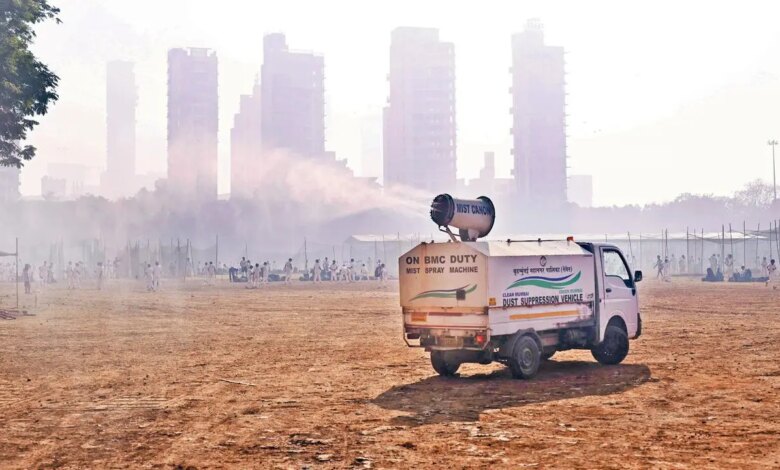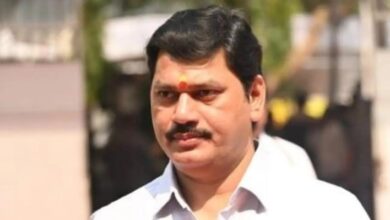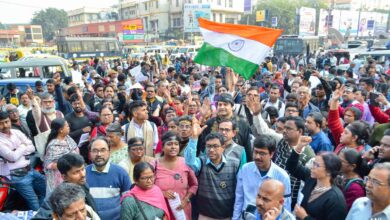Multiple interventions announced to fix air quality, combat climate change

The Brihanmumbai Municipal Corporation (BMC) has announced significant budgetary allocations and interventions in its civic budget to enhance environmental sustainability and combat air pollution. With a focus on air quality improvement, clean energy adoption, climate resilience, waste management and biodiversity conservation, the initiative aims to transform Mumbai into a greener and healthier metropolis, BMC officials claimed.
A senior BMC official stated, “Stringent environmental policies and increased monitoring highlight our commitment to reducing pollution and fostering a cleaner city.” Experts have, however, emphasised the need for a data-driven, transparent and action-oriented approach by BMC to address Mumbai’s air quality and environmental challenges.
(Left to right) Bhagwan Kesbhat, founder of Waatavaran; Dr Rakesh Kumar, president, Society for Indoor Environment; Hema Ramani, environment consultant
While acknowledging positive steps such as low-cost monitoring, emissions inventory, and clean fuel transition for bakeries, concerns remain over the lack of clear timelines, inadequate budget allocations for controlling construction-related pollution, and the need for stronger technological and policy interventions to mitigate both air and noise pollution. Additionally, experts highlighted the importance of improving walkability and sustainable transport options as essential measures for effective climate action.
Sustainability initiatives
The BMC’s environment and climate change department is spearheading holistic interventions through adaptation and resilience-building. The department is working with BMC wards to implement strategic actions under the Mumbai Climate Action Plan. These interventions span multiple key sectors, including energy and buildings, integrated mobility, sustainable waste management, urban greening and biodiversity, air quality management and urban flooding and water resource management.
A senior official highlighted that stringent environmental policies and increased monitoring underscore the civic body’s commitment to reducing pollution and fostering a cleaner city. These initiatives are aimed at making Mumbai more sustainable by addressing the pressing environmental concerns with targeted interventions and structured policy frameworks.
Air quality improvement
The BMC has implemented various interventions over the past year. This includes the enforcement of pollution control guidelines through 95 ward-level squads that monitor compliance and ensure implementation of the Environment Management Plan (EMP) for BMC projects. A key focus area is construction dust management, where a 28-point guideline has been introduced to mitigate air pollution originating from ongoing infrastructure projects.
Efforts to control street and airborne dust include the deployment of 67 tankers with a 5000-litre capacity and 39 tankers with a 9000-litre capacity for road washing. Misting machines now operate in two shifts daily, while mechanised road cleaning covers approximately 250 km each day.
The civic body is set to install five new Continuous Ambient Air Quality Monitoring Stations (CAAQMS) and procure four mobile air quality monitoring vans. To further suppress airborne dust particles, the BMC plans to introduce 100 battery-operated suction machines, allocating four per ward. The development of the ‘Mumbai Air’ app is also in progress, which BMC officials say will allow citizens to report air pollution complaints in real-time.
Moreover, BMC is scrutinising IIT Kanpur’s ‘Mumbai Air Network for Advanced Science (MANAS)’ proposal, which recommends the use of low-cost air pollution sensors for widespread monitoring.
The BMC has also collaborated with IITM Pune to develop an advanced air quality forecasting system with a 72-hour lead time. The system will provide early warnings by quantifying contributions from local, regional, and distant emission sources to particulate matter pollution in Mumbai. It will also offer potential emission reduction strategies, ensuring that preventive and mitigation measures can be taken in a timely manner.
Climate budgeting
Mumbai has become the fourth city globally to introduce a Climate Budget Report. The BMC’s first Green Budget Book aligns capital expenditures with environmental goals, accounting for 32 per cent of the total capital budget for FY 2024-25. For this financial year, R113.18 crore has been allocated to the environment department. “This move marks a significant step toward integrating climate considerations into financial planning, ensuring that funds are directed towards sustainable development projects that will have a lasting impact on the city’s ecological footprint,” the budget document read.
Clean energy
The BMC is actively working toward the development of net zero infrastructure, including the construction of a net zero office in the H East (Santacruz East) ward. This facility will generate more solar power than its electricity consumption, while also implementing net zero waste and net zero water strategies. In alignment with the PM Surya Ghar: Muft Bijli Yojana, the BMC is collaborating with Mahavitaran to install rooftop solar panels on municipal properties, promoting the widespread adoption of renewable energy sources.
Waste management
Under Swachh Bharat Abhiyan 2.0, the BMC has approved the City Sanitation Action Plan, which aims to enhance sanitation infrastructure. This includes the development of 15,000 community toilet seats, 400 aspirational toilets, 4672 individual household latrines and 500 urinals. These efforts are expected to significantly improve sanitation and waste management across the city, contributing to a cleaner and healthier urban environment.
The civic body has also implemented a Garbage-Free Hours Initiative under its 100-Day Action Plan for Cleaner Mumbai. This initiative, which commenced on January 15, 2025, ensures that waste-free streets are maintained during specific hours each day, reinforcing the city’s commitment to efficient waste management practices.
‘Data centre sorely needed’
Dr Rakesh Kumar, president, Society for Indoor Environment (SIE), said, “Mumbai needs a data analytics centre for all the air quality data collected from various agencies. This should have been the top priority as it would provide much-needed inputs for action-oriented air pollution control and prevention. The BMC should invest and detail out the walkability needs and actions.”
Sumaira Abdulali, the convenor of Awaaz Foundation, said, “The BMC’s ‘scrutiny’ of IIT Kanpur’s proposal to provide more detailed data at source using low-cost monitors, five new continuous monitoring stations and four new monitoring vans is welcome. However, no time period for scrutiny and no information about how the data would be communicated to citizens is specified. In the meantime, budgetary allocations to combat known sources of air and noise pollution such as construction are not even addressed. I am disappointed that the BMC has not allocated resources towards state-of-the-art, international-grade construction methods while promising citizens that it is constructing a world-class city and allocating the bulk of its funding towards this goal.”
She added, “Merely suppressing the resuspension of dust is wholly inadequate to control the dangerous air quality levels visible at construction sites. Extremely high noise pollution levels have also not been addressed and the BMC has not integrated any technological or logistical improvements to prevent air and noise pollution at source in their budgetary allocations.”
‘A step in the right direction’
Hema Ramani, an environment consultant, said the focus on bakeries and cemeteries should be appreciated. “The BMC has already initiated work on transition of bakeries to cleaner fuels, by involving the bakery owners. This will reduce nearly five to six per cent of source pollution. As per the High Court order, once licences to operate bakeries are given only to units using clean fuels, the pollution from this source will be completely eliminated,” Ramani said.
Bhagwan Kesbhat, founder of Waatavaran, said, “Initiatives like the advanced air quality forecast system, use of a low-cost sensor monitoring network and the detailed emissions inventory for MMR is certainly a step in the right direction in managing and reducing air pollution if implemented properly. Walkability and procurement of electric buses will boost sustainable transport practices in the city. Construction sites should be encouraged to practice C&D guidelines and regulations to reduce pollution from the construction industry and proper disposal of debris will eliminate the issue of solid construction waste.”
Source link





